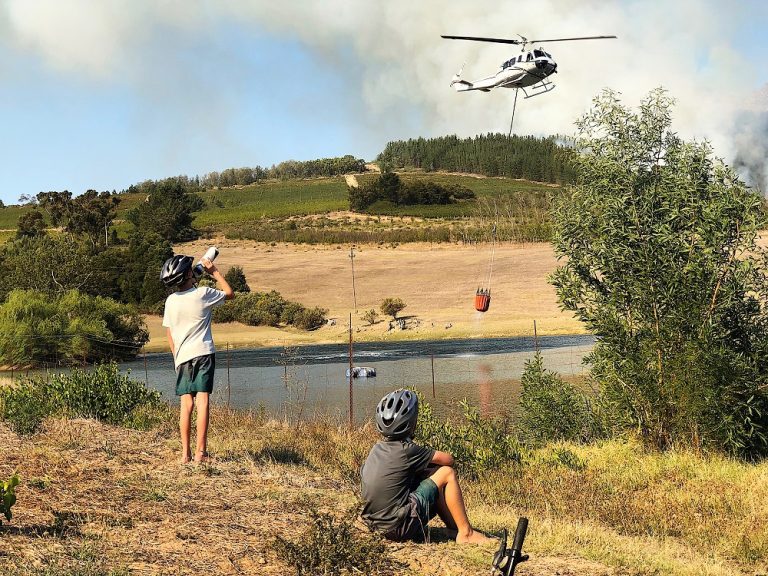We live in an area with relatively few extreme weather episodes. Sure, it gets hot in the summer and cold in the winter – but rarely do extreme hurricanes, tornados, or earthquakes hit our area. However, this year forest fires have been a bigger concern than usual. It seems that every time we turn on the TV there is a natural disaster somewhere. Combine that with the smoke we’ve experienced this year, and my 6 yr old is now very concerned, even scared of natural disasters. She’s learned that weather isn’t just something we dress for; it’s something that can hurt us. So, to ease her anxiety, I set out to learn how to talk to kids about natural disasters.
How to talk to kids about wildfires:
We can’t always control what our kids see and hear or what potential disasters we may one day face. What we do have control over is the way we deal with our kids’ worries and our reactions.
1) Always normalize their fears, “it’s normal to be fearful of that. Let’s talk about it, and maybe you’ll feel better if you understand it more?”
2) Reassure kids that we will always do everything we can to keep them safe.
3) Reassure kids that we have ways of knowing if a fire is getting close, and we’d have time to activate our plan.
4) Explain that parents have a plan for if that were ever to happen. In our case, we’d pack up our things and go to Grandma’s house. I allowed my 6 yr old to talk about the special things she’d like to bring if that were ever to happen. We talked about bringing the cat, our photos, special stuffies etc. She took comfort in knowing there was a plan and her parents were in control which eased some fears.
5) Remember that each child is different; some kids find it helpful to see images on TV (rather than not knowing what to expect). Others find it very scary and unsettling, and it’s ok to ask your child what they feel may help ease their concerns.
6) Always keep it matter-of-fact and age-appropriate. Some kids do well understand the reasons behind why the fire started (ie. lightning and drought can start wildfires but also human negligence or arson.
7) You know your child best, always base the amount of information you provide on what’s best for them.
How to talk to kids about hurricanes:
1) Acknowledge their thoughts and fear about it.
2) Explain in simple terms exactly what a hurricane is “A hurricane is a strong storm that forms over the ocean; it moves very fast and produces very strong winds and rain. Once it hits land, it can cause some damage but generally loses its power as it moves over land”
3) Always maintain a sense of control, don’t panic. Kids look to us to be calm and in control; if we’re not appearing to be in control, it can spiral their fears.
4) Reassure your child that you have a safety plan in place and go over that with them. Explain that even at school, the teacher has a safety plan so everyone is always prepared and will keep them safe.
5) Depending on your child, limit access to news about hurricanes and natural disasters. Some kids like having more information to help them understand and process. For other kids, it can be too overwhelming. You know your child best, so approach their exposure accordingly.
How to talk to kids about tornados:
Recently, on a trip to Chicago with my daughter, we had our first experience with a Tornado. It’s opened up a lot of questions and fears about them. Here are some ways we’ve been talking about it.
1) Reassure and acknowledge her fears about Tornados. We’ve explained that we don’t live in a place that experiences large tornados but that if we did, we would know ahead of time – just like we did in Chicago when we heard the sirens.
2) We talk through the plan so that we will all remain calm because we know exactly what to do. We take shelter in the basement or the middle of the house or building we’re in.
3) We’ll continue to remain calm, even though it may get noisy. We can wait it out by playing games, sing songs etc.
4) We talk a lot about exactly what a tornado is and explain it in simple terms “When there is a thunderstorm, sometimes (ONLY sometimes) the air swirls so much it creates a cone-shaped cloud that can swirl over the earth and can knock down trees and damage buildings”
Here is a great little video with The Weather Network and Elmo.
How to talk to kids about natural disasters:
With any natural disasters, kids will have questions, fears and even some seemingly weird obsessions about them (like, lava. Which parent hasn’t answered hundreds of questions about lava?).
The key to answers and coping with these types of situations is:
REMAIN CALM.
REASSURANCE THAT WE HAVE A PLAN.
AGE-APPROPRIATE FACTUAL ANSWERS.
LIMIT NEWS EXPOSURE IF NEEDED.
If you’re dealing with the aftermath of a natural disaster or feel you need more assistance with helping your kids understand a cope with the fears of natural disasters, The National Child Traumatic Stress Network is a great resource.
If your kids are curious about climate change, this is a great way to talk to them about it!

